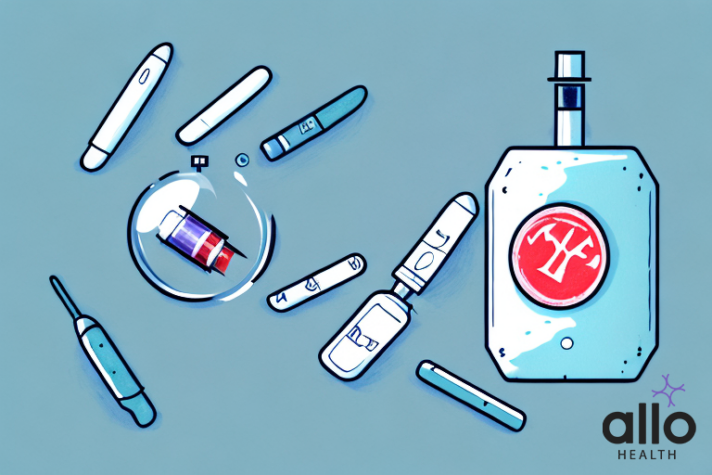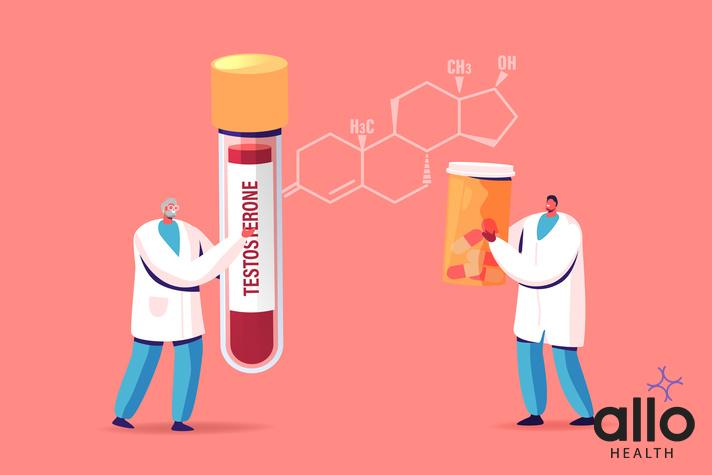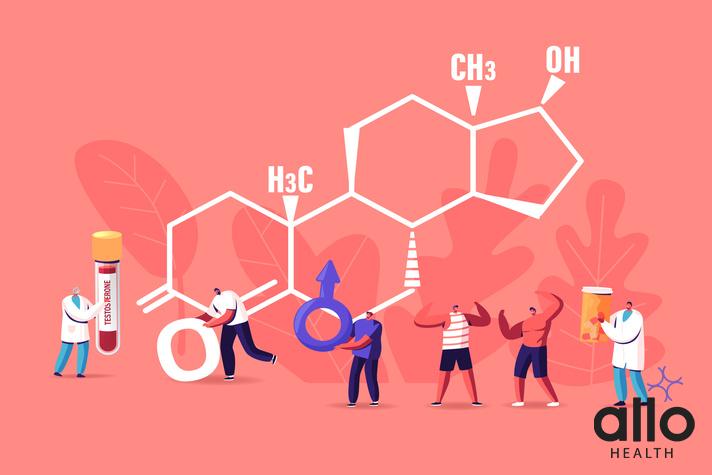What Is the Average Price of a Testosterone Injection?

Allo Health is dedicated to personalized well-being, offering support and trusted information tailored to individual health goals. The platform emphasizes human-generated content, led by a distinguished medical team of experts, including physicians and sexual health specialists. Their commitment to credibility involves rigorous fact-checking, authoritative research, and continuous updates to ensure accurate, up-to-date information. Allo Health's unique approach goes beyond conventional platforms, providing expert-led insights and a continuous commitment to excellence, with user feedback playing a crucial role in shaping the platform's authoritative voice.

Dr Sanina Mansoor holds MBBS degree from Yenepoya university,Mangalore.She has 8 years of experience working as a medical officer at various health centres and medical colleges.
Why This Was Upated?
Our experts continually monitor the health and wellness space, and we update our articles when new information became available.
Updated on 09 April, 2024
- Article was updated as part of our commitment to diversity, equity, and inclusion.

"The following blog article may discuss medical treatments and interventions. However, it is important to note that the information provided is for general educational purposes only and should not be considered as a substitute for professional medical advice, diagnosis, or treatment. Always seek the guidance of a qualified healthcare professional for personalized medical advice.
Book consultation
Medical treatments are complex and should be tailored to individual circumstances. The information presented in this blog may not be applicable to everyone, as each person's medical condition, history, and needs are unique. Only a qualified healthcare professional can evaluate your specific medical situation, consider relevant factors, and provide appropriate recommendations for diagnosis, treatment options, and monitoring.
It is crucial to note that self-diagnosis, self-medication, or relying solely on the information provided in this blog for treatment decisions can have serious health consequences. "
Testosterone injections are a popular form of testosterone replacement therapy (TRT) among men who suffer from low testosterone levels. As with any medical treatment, the cost of testosterone injections can vary depending on many factors.
What is Testosterone?
- Testosterone is a naturally occurring hormone (male sex hormone) found in both men and women, although it is primarily associated with male reproductive health.
- It belongs to a class of hormones called androgens and is produced in the testicles in men and in smaller amounts in the ovaries and adrenal glands in women.
- Testosterone plays a crucial role in various bodily functions, including the development of male sexual characteristics, regulating sex drive (libido), maintaining muscle mass and bone density, influencing mood and energy levels, and contributing to sperm production.
- It also has broader effects on overall health, including cardiovascular function and metabolic regulation.
- In men, testosterone levels typically peak in early adulthood and gradually decline with age.
Why is Testosterone Important?
Testosterone is important for several key physiological functions in both men and women:
- Development of sexual characteristics: In males, testosterone is responsible for the development of primary and secondary sex characteristics, including the growth of the penis, testes, and facial hair during puberty.
- Regulation of libido: Testosterone plays a vital role in sexual desire and libido in both men and women. It influences sexual arousal and responsiveness.
- Maintenance of muscle mass and bone density: Testosterone helps in the growth and maintenance of lean muscle mass. It also contributes to bone density, which is important for overall strength and structural integrity.
- Metabolic function: Testosterone has an impact on metabolism. It can influence fat distribution and muscle mass, which in turn affect metabolism and energy levels.
- Mood and well-being: Testosterone levels can influence mood, energy levels, and overall sense of well-being. Low testosterone levels may contribute to feelings of fatigue, depression, and reduced motivation.
- Sperm production: In men, testosterone is crucial for the production of sperm. It supports the development and maturation of sperm cells.
- Cognitive function: Some studies suggest that testosterone may have a role in cognitive functions such as memory, spatial abilities, and cognitive processing speed.
- Cardiovascular health: Testosterone can influence cardiovascular health, including factors like blood pressure and cholesterol levels. However, the relationship between testosterone levels and cardiovascular health is complex and not fully understood.
- Regulation of red blood cell production: Testosterone can influence the production of red blood cells in the bone marrow, which is important for oxygen transport in the body.
- Support for overall health: Adequate testosterone levels contribute to a general sense of vitality and well-being. It also supports immune function and overall health.
While testosterone is crucial for these functions, its levels need to be within a healthy range. Both low and high levels of testosterone can have adverse effects on health and well-being. If an individual suspects they have concerns related to testosterone levels, consulting a healthcare provider is recommended for proper evaluation and management.
Indications of High Testosterone Levels
- Increased muscle mass: High testosterone levels can lead to rapid muscle growth and increased strength.
- Excessive body hair: Individuals may experience increased body and facial hair growth, known as hirsutism.
- Acne and oily skin: Elevated testosterone levels can lead to overactive oil glands, resulting in acne and oily skin.
- Irregular menstrual cycles: In women, high testosterone can disrupt menstrual regularity or lead to absent periods (amenorrhea).
- Deepening of voice: Women with high testosterone may experience a deepening of their voice.
- Enlarged clitoris: In women, an enlarged clitoris (clitoromegaly) can be a sign of elevated testosterone levels.
- Aggressive behavior: High testosterone levels may be associated with increased aggression or assertiveness.
- Mood swings: Elevated testosterone can lead to mood swings, irritability, or even aggression.
- Decreased breast size: In women, high testosterone can lead to a reduction in breast size.
- Hair thinning or balding: High testosterone levels in both men and women can contribute to hair thinning or male-pattern baldness.
- Decreased breast tenderness: Elevated testosterone in women can lead to a decrease in breast tenderness during the menstrual cycle.
- Reduced fertility: High testosterone levels can disrupt the menstrual cycle and reduce fertility in women.

Indications of Low Testosterone Levels
Some of these indications can also be related to other hormonal imbalances or medical conditions.
- Decreased libido: Reduced sex drive and diminished interest in sexual activity.
- Erectile dysfunction: Difficulty achieving or maintaining erections during sexual activity.
- Fatigue and reduced energy: Persistent lack of energy and general feelings of fatigue.
- Decreased muscle mass: Reduction in muscle size and strength.
- Increased body fat: Accumulation of excess body fat, particularly around the abdomen.
- Mood changes: Symptoms may include irritability, mood swings, and feelings of sadness or depression.
- Loss of bone mass: Low testosterone levels can lead to decreased bone density, increasing the risk of fractures.
- Reduced hair growth: Thinning of facial and body hair can be indicative of low testosterone.
- Difficulty concentrating: Reduced focus, memory issues, and difficulty concentrating on tasks.
- Hot Flashes: Some men may experience hot flashes or sweats, similar to symptoms in menopause.
- Changes in sleep patterns: Lack of testosterone may cause insomnia (lack of sleep), disrupted sleep, or increased fatigue during the day.
- Decreased Motivation: Reduced drive and enthusiasm for activities or goals.
If an individual suspects they have low testosterone levels and experiences these indications, it is advisable to seek medical advice from a healthcare provider for proper evaluation and potential treatment options.
What is Testosterone Replacement Therapy?
- Testosterone Replacement Therapy (TRT) is a medical treatment designed to address low testosterone levels in individuals.
- It involves administering synthetic or bioidentical testosterone to supplement or replace the body’s natural production.
- This therapy is typically prescribed for men with clinically diagnosed low testosterone levels, known as hypogonadism.
- TRT can be administered through various forms, including injections, patches, gels, pellets, and creams, under the guidance and supervision of a healthcare provider.
- The goal of TRT is to restore testosterone levels to within a normal range, alleviating associated symptoms and improving overall well-being.
- It’s essential for individuals considering TRT to undergo proper evaluation and receive treatment under the care of a qualified healthcare professional.
What are Testosterone Injections?
- Testosterone injections are a form of Testosterone Replacement Therapy (TRT) used to address low testosterone levels in individuals, a condition known as hypogonadism.
- These injections deliver synthetic or bioidentical testosterone directly into the bloodstream. They are typically administered in the form of intramuscular injections, usually into the gluteal muscle.
- Testosterone injections provide a controlled and sustained release of the hormone, helping to restore testosterone levels to within a normal range.
- The frequency and dosage of injections are determined by a healthcare provider based on individual needs and response to treatment.
- It’s crucial for individuals to receive testosterone injections under the supervision of a qualified healthcare professional.
What is the Procedure Like?
- Consultation with healthcare provider: The process begins with a consultation with a healthcare provider. They will evaluate your medical history, symptoms, and conduct necessary tests to determine if testosterone replacement therapy (TRT) is appropriate for you.
- Prescription and dosage determination: If TRT is recommended, your healthcare provider will prescribe the appropriate form of testosterone (usually in the form of an injectable compound) and determine the dosage based on your specific needs.
- Choosing an injection site: Testosterone injections are typically administered into the muscle, most commonly in the gluteal (buttock) region. Your healthcare provider will provide specific guidance on the exact location.
- Sterilization: The chosen injection site is cleaned with an alcohol swab to minimize the risk of infection.
- Post-injection care: The area is gently massaged to help disperse the medication and reduce any potential discomfort. Excessive pressure and rubbing should be avoided.
- Follow-up: Schedule regular follow-up appointments with your healthcare provider to monitor your progress, assess any potential side effects, and adjust dosage if necessary.
It’s crucial to follow your healthcare provider’s instructions precisely, including dosage, injection technique, and recommended schedule. Additionally, report any unusual or concerning symptoms to your healthcare provider promptly. Always consult with your healthcare provider if you have any questions or concerns about the TRT process.
What to Expect:
During testosterone replacement therapy with injections, individuals can expect several effects:
- Increased energy and vitality: Many experience a boost in energy levels and an overall sense of well-being.
- Improved mood: Testosterone can positively impact mood and alleviate symptoms of depression or mood swings associated with low testosterone levels.
- Enhanced libido and sexual function: For those with low testosterone, improved sexual desire and performance are common outcomes.
- Muscle mass and strength: Testosterone plays a crucial role in muscle development. TRT can lead to an increase in muscle mass and strength when combined with regular exercise.
- Reduced fat mass: Testosterone aids in fat metabolism, which can result in a decrease in body fat percentage.
- Bone density maintenance: It helps maintain bone mineral density, reducing the risk of osteoporosis and fractures.
- Improved cognitive function: Some studies suggest that testosterone may positively influence cognitive abilities, including memory and spatial reasoning.
- Elevated hemoglobin levels: Testosterone can increase red blood cell production, improving oxygen-carrying capacity in the blood.
- Potential mood stabilization: It may help stabilize mood, particularly in individuals with mood disorders related to low testosterone.
- Hair growth: In some cases, TRT may promote hair growth and reduce the risk of male pattern baldness.
- Skin changes: Some individuals may notice improvements in skin tone and texture.
- Elevated testosterone levels: Regular administration of testosterone injections will lead to consistently elevated testosterone levels.
Individual responses to TRT can vary. Not everyone will experience the same effects, and results may take time to manifest. Additionally, the benefits of TRT should be balanced with potential risks and monitored by a healthcare provider.
Regular follow-up appointments and blood tests are crucial to ensure the treatment is safe and effective.
As with any medical intervention, open communication with a healthcare provider is essential throughout the treatment process.
Common Side Effects of Testosterone Injections
Common side effects of testosterone injections may include:
- Pain or discomfort at the injection site: This is a common and usually temporary side effect. It can be minimized by proper injection technique.
- Acne or oily skin: Increased testosterone levels can lead to increased oil production in the skin, potentially causing acne.
- Fluid retention: Some individuals may experience mild fluid retention, leading to swelling in the hands, feet, or ankles.
- Changes in mood or behavior: Testosterone can influence mood and behavior, potentially leading to mood swings, irritability, or increased aggression.
- Increased red blood cell count: Testosterone therapy can stimulate the production of red blood cells, which may lead to elevated hematocrit levels. This can increase the risk of blood clots and other cardiovascular issues.
- Decreased testicular size: Prolonged use of testosterone therapy can lead to a reduction in testicle size due to a decrease in natural testosterone production.
- Sleep apnea: Testosterone therapy can worsen obstructive sleep apnea, a condition characterized by disrupted breathing during sleep.
- Breast tenderness or enlargement: Some individuals may experience breast tenderness or enlargement, a condition known as gynecomastia.
- Elevated cholesterol levels: Testosterone therapy can lead to an increase in LDL cholesterol levels, which may need to be monitored.
- Headaches: Some individuals may experience headaches as a side effect of testosterone therapy.
- Hirsutism: In some cases, testosterone therapy can lead to increased hair growth in areas where men typically grow hair, such as the face.
- Changes in libido: Testosterone therapy can affect sexual desire, leading to an increase or decrease in libido.
- Suppression of sperm production: Testosterone therapy can suppress sperm production, potentially leading to temporary infertility.

Not everyone will experience these side effects, and many individuals tolerate testosterone therapy well. Additionally, any side effects should be discussed with a healthcare provider, who can provide guidance and make any necessary adjustments to the treatment plan.
In rare cases, allergic reactions or more severe side effects may occur. If an individual experiences symptoms like difficulty breathing, swelling of the face, lips, tongue, or throat, or severe chest pain, they should seek doctor for advice and attention.
Who Should Avoid Testosterone Injections?
Testosterone injections may not be suitable for everyone, and there are specific groups of individuals who should avoid or use them with extreme caution. These include:
- Men with prostate cancer: Testosterone can potentially stimulate the growth of existing prostate cancer cells. Therefore, men with a history of prostate cancer or currently diagnosed with it should avoid testosterone therapy.
- Men with breast cancer: Similarly, testosterone therapy can potentially exacerbate breast cancer in men. Individuals with a history of breast cancer should avoid testosterone treatment.
- Men with high red blood cell counts: Testosterone can increase the production of red blood cells, which may lead to elevated hematocrit levels. This can be problematic for individuals with conditions like polycythemia or obstructive sleep apnea.
- Individuals with heart conditions: Testosterone therapy may worsen certain cardiovascular conditions, especially in men with severe heart failure, coronary artery disease, or those who have recently had a heart attack.
- Patients with liver disease or severe kidney disease: Testosterone is metabolized by the liver, and individuals with severe liver disease may not process it effectively. This can lead to an accumulation of testosterone in the body, potentially causing adverse effects. Additionally, patients with kidney disease should also practice caution.
- Men with sleep apnea: Testosterone therapy can potentially worsen obstructive sleep apnea, a condition characterized by disrupted breathing during sleep.
- Men with uncontrolled erythrocytosis: This condition involves an abnormally high number of red blood cells and can be exacerbated by testosterone therapy.
- Individuals with allergies to restosterone: People who have experienced allergic reactions to testosterone or any of its components should avoid testosterone injections.
- Women: Testosterone injections are typically not recommended for women, as they can lead to masculinizing effects. In cases where testosterone is medically prescribed for women, it is under strict supervision and tailored to individual needs.
It can also affect bone growth and reduce final height of the individual.
A qualified healthcare provider will evaluate each individual’s specific health circumstances and determine the appropriateness of testosterone therapy based on their medical history, current health status, and treatment goals.
Price of Testosterone Injections in India
The price of testosterone injections in India can vary widely depending on factors such as the brand, dosage, and location. On average, a single vial of testosterone injection may range from approximately INR 500 to INR 1500 or more.
Key Takeaways
- Indications of high testosterone levels include increased muscle mass, excessive body hair, acne, irregular menstrual cycles in women, deepening of voice, and more.
- Indications of low testosterone levels encompass decreased libido, erectile dysfunction, fatigue, decreased muscle mass, increased body fat, mood changes, and more.
- Testosterone Replacement Therapy (TRT) involves administering synthetic or bioidentical testosterone to address low testosterone levels. It aims to restore testosterone levels, alleviate symptoms, and improve overall well-being.
- Testosterone injections are a form of TRT. They deliver testosterone directly into the bloodstream through intramuscular injections, typically into the gluteal muscle. The procedure involves consultation with a healthcare provider, prescription, choosing an injection site, sterilization, and post-injection care.
- Potential effects of TRT with injections include increased energy, improved mood, enhanced libido and sexual function, increased muscle mass and strength, reduced fat mass, maintenance of bone density, and more.
- Common side effects of testosterone injections encompass pain or discomfort at the injection site, acne or oily skin, fluid retention, changes in mood or behavior, increased red blood cell count, decreased testicular size, and more.
- Testosterone injections may not be suitable for individuals with certain conditions, including prostate cancer, breast cancer, high red blood cell counts, heart conditions, liver disease, sleep apnea, uncontrolled erythrocytosis, allergies to testosterone, and women (unless medically prescribed under strict medical supervision).
- The price of testosterone injections in India can range from approximately INR 500 to INR 1500 or more, depending on factors like brand, dosage, and location.
Frequently Asked Questions
Q: What are common side effects of testosterone injections?
A: The most common side effects of receiving testosterone injections include shortness of breath, acne, increased appetite, weight gain, persistent erections, painful testicles, hot flushes, joint pain, skin reactions such as severe rash and dry skin, enlarged prostate gland and related problems, pain, bruising, night sweats and irritation (other injection site reactions).
Q: Can male hypogonadism cause depressive moods?
A: Yes, male hypogonadism, characterized by low testosterone levels, can lead to depressive moods. Testosterone plays a role in mood regulation, and a deficiency can contribute to symptoms of depression and low energy levels.
Q: Can testosterone injections cause abnormal blood coagulation?
A: Testosterone injections have the potential to increase red blood cell production, which may lead to elevated hematocrit levels. In some cases, this can affect blood coagulation, potentially increasing the risk of blood clots. It’s important for individuals receiving testosterone therapy to undergo regular monitoring and consult their healthcare provider for any concerns about blood coagulation.
Q: How can I get my testosterone levels tested?
A: To get your testosterone levels tested, you can visit a healthcare provider, such as an endocrinologist or a urologist. They will typically order a blood test to measure your blood testosterone levels. This test is usually performed in the morning when testosterone levels are highest. It’s important to consult with a healthcare professional to discuss symptoms, concerns, and determine if testing is necessary.
Q: Does testosterone increase the growth of prostate cancer?
A: Testosterone has the potential to stimulate the growth of existing prostate cancer cells, which is why men with a history of prostate cancer or at risk of prostate cancer should avoid testosterone therapy. It’s crucial for individuals with such history to discuss the risks and benefits with their healthcare provider before considering any form of testosterone treatment.






































